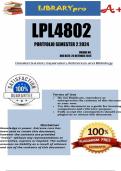LPL4802
PORTFOLIO SEMESTER 2 2024
UNIQUE NO.
DUE DATE: 25 OCTOBER 2024
, LPL4802
October November Portfolio Semester 2 2024
Unique Number:
Due Date: 30 October 2024
Law of Damages
Question 1
Introduction
In the South African law of delict, damages can be classified into two broad categories:
patrimonial loss, which refers to pecuniary or financial harm, and non-patrimonial
loss, which covers injuries that cannot be quantified in monetary terms, such as pain,
suffering, and shock. This essay will examine the requirements for a successful claim
for shock as a head of damage for non-patrimonial loss, with reference to the case
Komape and Others v Minister of Basic Education and Others 2020 (2) SA 347
(SCA). Additionally, it will critically analyse the court’s reasoning for dismissing
constitutional damages as a claim in addition to common law damages.
1.1. Claiming for Shock as a Head of Non-Patrimonial Loss
Non-patrimonial loss, such as shock, is considered a form of psychiatric injury that a
plaintiff may suffer as a result of a wrongful act. In order to successfully claim for shock,
the plaintiff must prove several key elements in accordance with delictual principles:
A. Wrongfulness
The first requirement is wrongfulness. This means that the act or omission by the
defendant must be unlawful in the sense that it infringes a legally protected interest of
the plaintiff. In the case of Komape, the court had to assess whether the defendants,
including the Minister of Basic Education, acted wrongfully in failing to provide adequate




